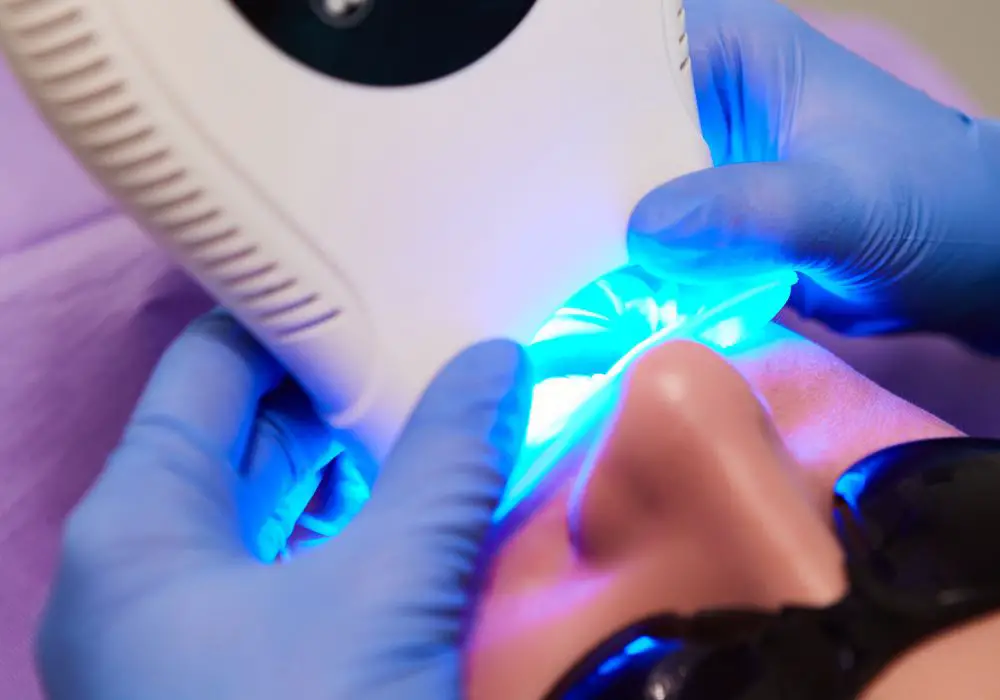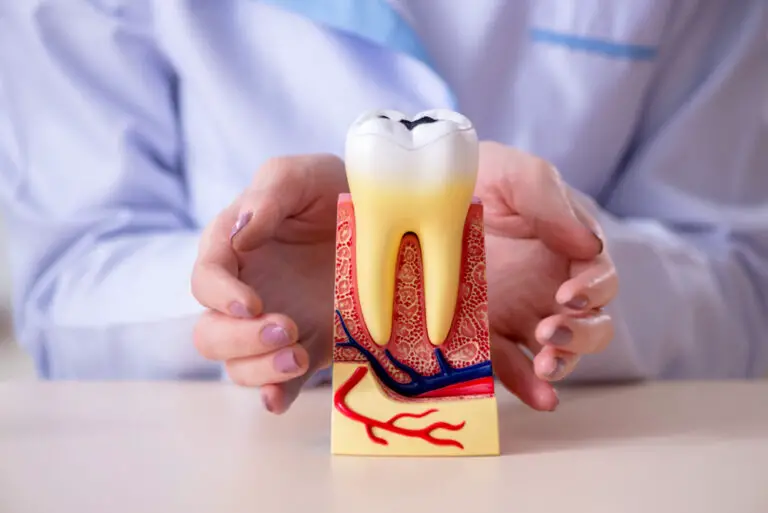Tooth sensitivity and pain are very common side effects experienced by many people after having their teeth whitened. While usually mild and temporary, it can cause significant discomfort. There are several factors that explain why teeth may hurt and become sensitive after whitening treatments.
What Causes Teeth to Hurt After Whitening?

There are a few main reasons why whitening treatments commonly lead to tooth sensitivity:
Enamel Erosion
Whitening products contain peroxide-based gels that work to penetrate the enamel and oxidize stains. However, this process also demineralizes and erodes the enamel layer of the teeth. Enamel is the hard, protective outer surface that when weakened exposes the sensitive dentin underneath.
Inflammation of Tooth Nerves
The inner dentin layer contains thousands of microscopic tubules leading to the pulp chamber at the center of the tooth. This chamber houses the nerve endings and blood vessels. When whitening gels reach this inner layer, they can irritate and inflame the nerves, making them hypersensitive.
Microscopic Cracks
Studies using electron microscopes have shown evidence that whitening treatments can create tiny cracks and fractures in the enamel. These defects allow for increased penetration to inner layers during treatment, causing sensitivity.
Chemical Burns
Highly concentrated peroxide gels can essentially “burn” the surface of the teeth, damaging enamel and exposing nerve endings. This chemical damage is one mechanism of pain after whitening.
Dehydration
Whitening gels are designed to dehydrate the teeth to allow better diffusion and light activation. This temporary shrinkage of the inner dentin layer leaves nerve endings with less fluid protection, making them more likely to register sensations as pain.
Increased Porosity
The cumulative effect of enamel erosion, cracking, and dehydration from peroxide gels is increased porosity of the tooth surface. This allows for hot/cold liquids, air, sugar, etc to penetrate quickly and trigger stronger nerve sensations.
Types of Tooth Pain After Whitening

There are a few common types of tooth sensitivity experienced after whitening:
Cold Sensitivity
The most common complaint is severe discomfort from exposure to cold air, drinks, ice cream, etc. Nerves register cold sensations as pain.
Heat Sensitivity
Some patients also report increased sensitivity to hot food and beverages after whitening. The heat triggers inflamed nerves.
Pressure and Biting Pain
Difficulty biting down and pain when chewing, especially hard or crunchy foods, is common. This indicates sensitivity near the neck of the tooth.
Spontaneous Nerve Pain
In more severe cases, people may have shooting, throbbing, or electric nerve pain with no apparent trigger, indicating inflammation of the nerve endings.
Gum Pain
Gum tissues can also become irritated and inflamed after contact with whitening gel during the procedure, causing soreness and tenderness.
Why do Some People Experience More Pain Than Others?
While nearly all people experience some sensitivity after professional whitening, the severity and duration varies between patients based on:
- Baseline tooth color – darker staining requires more intense whitening
- Enamel thickness – thinner enamel erodes faster to the sensitive dentin layer
- Age – enamel naturally weakens over time
- Genetics – size and depth of nerve endings varies
- Hydration – people with chronic dry mouth lack fluid protection in the teeth
- Pre-existing sensitivity or recession – worsened by whitening
- Frequency of whitening sessions – leads to cumulative enamel erosion
People with thinner enamel or naturally sensitive teeth are much more prone to pain with whitening treatments.
How Long Does Tooth Sensitivity Last After Whitening?
The duration of sensitivity can last:
- Immediately after – Most intense pain in the first 24 hours
- 2-3 days – Moderate to mild sensitivity starts to improve
- 1 week – Up to 50% of patients still have some lingering sensitivity
- 2 weeks – Approximately 10% still report sensitivity
- 3-4 weeks – Only a small percentage still have tooth pain this long after whitening
For at-home whitening, the pain may be delayed slightly but follows a similar duration before decreasing.
Managing and Preventing Pain From Whitening

There are several ways to help minimize or prevent tooth sensitivity after whitening:
- Use desensitizing toothpaste before and after whitening
- Get fluoride treatments to strengthen enamel
- Avoid very hot or cold triggers
- Take over-the-counter pain medication as needed
- Apply desensitizing pastes or gels
- Chew sugar-free gum to stimulate soothing saliva
- Get touch-up whitening treatments rather than full repeats
- Avoid overusing whitening products or sessions
Seeing a dentist for evaluation and possible dental work may be required in cases of:
- Severe, unrelieved pain lasting more than 2 weeks
- Tooth sensitivity recurring with each whitening session
- No improvement using desensitizing methods
Frequently Asked Questions
Why do some teeth become more sensitive than others after whitening?
Certain teeth can be more prone to sensitivity based on factors like thickness of enamel, size of nerve chambers, presence of cracks or decay, and amount of natural wear or recession. Front teeth tend to have the thinnest enamel and be more vulnerable to sensitivity from whitening.
Is it normal for gums to hurt after teeth whitening?
Yes, it’s common for gums to become temporarily irritated, inflamed, or sore from incidental contact with whitening gel during the treatment process. Care is taken to isolate the gums, but some exposure may occur and cause short-term pain.
How long should I wait between whitening sessions for sensitivity to subside?
It’s recommended to wait at least 2 weeks between whitening sessions to allow the enamel and nerve endings a chance to rehydrate, heal, and recover. Repeated whitening too soon can increase cumulative damage and pain over time.
Can sensitive teeth still be whitened safely?
Teeth with pre-existing sensitivity issues can still be whitened but may require shorter application times, lower peroxide concentrations, and desensitizing pretreatments to minimize discomfort. Gentler formulas are also available.
What home remedies can I use for sensitivity after whitening?
Desensitizing toothpaste, fluoride rinses, over-the-counter pain medication, chewing gum, using desensitizing gels/pastes, and avoiding hot and cold food and drink can all help relieve sensitivity from at-home whitening.
Conclusion
Mild to moderate tooth sensitivity is expected after professional or at-home whitening treatments due to enamel erosion, inflammation, and dehydration effects. Proper oral care and prevention can help manage discomfort. However, recurrent or severe tooth pain may need exam and treatment by a dentist. With some patience and TLC for your teeth, sensitivity caused by whitening is usually temporary.






